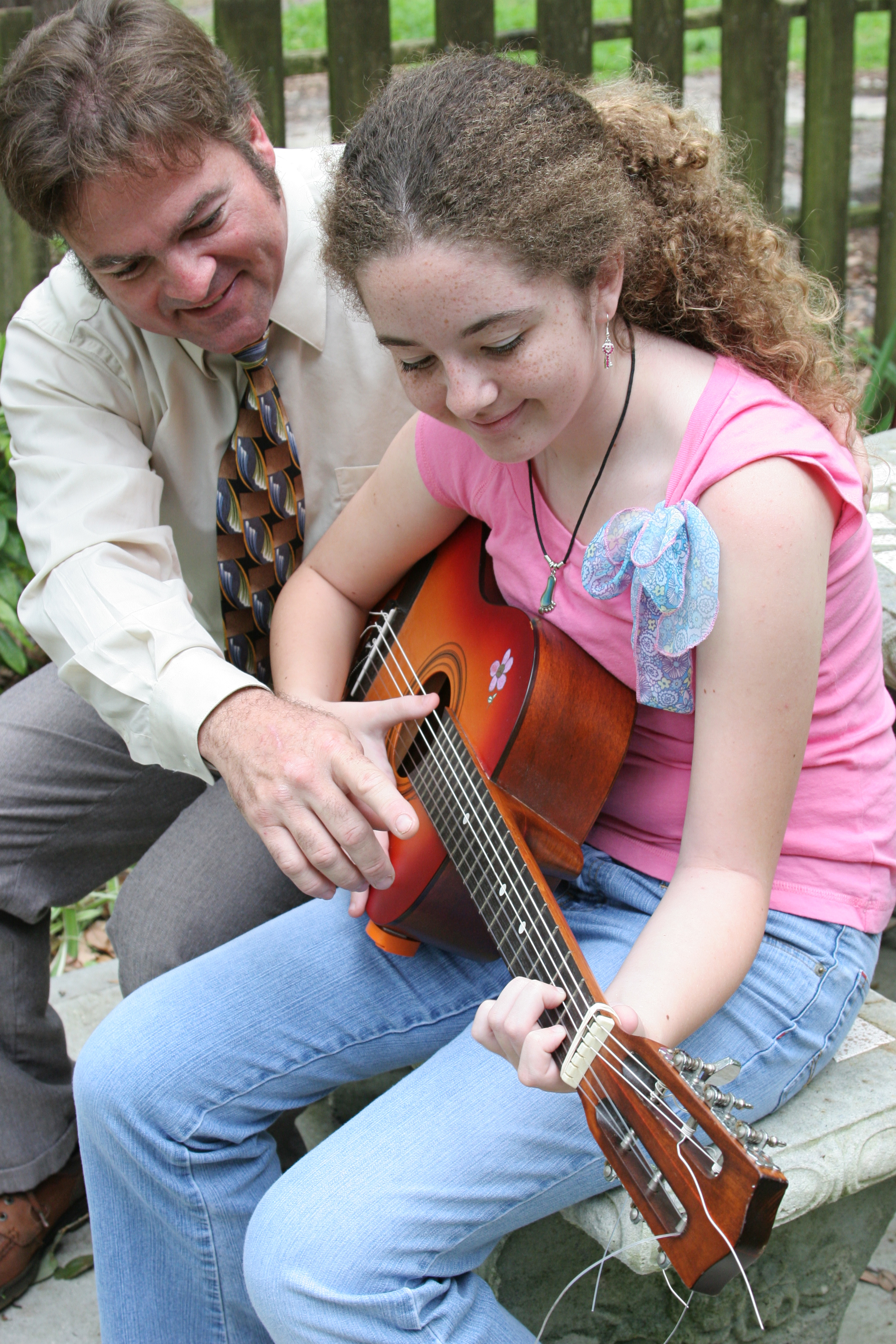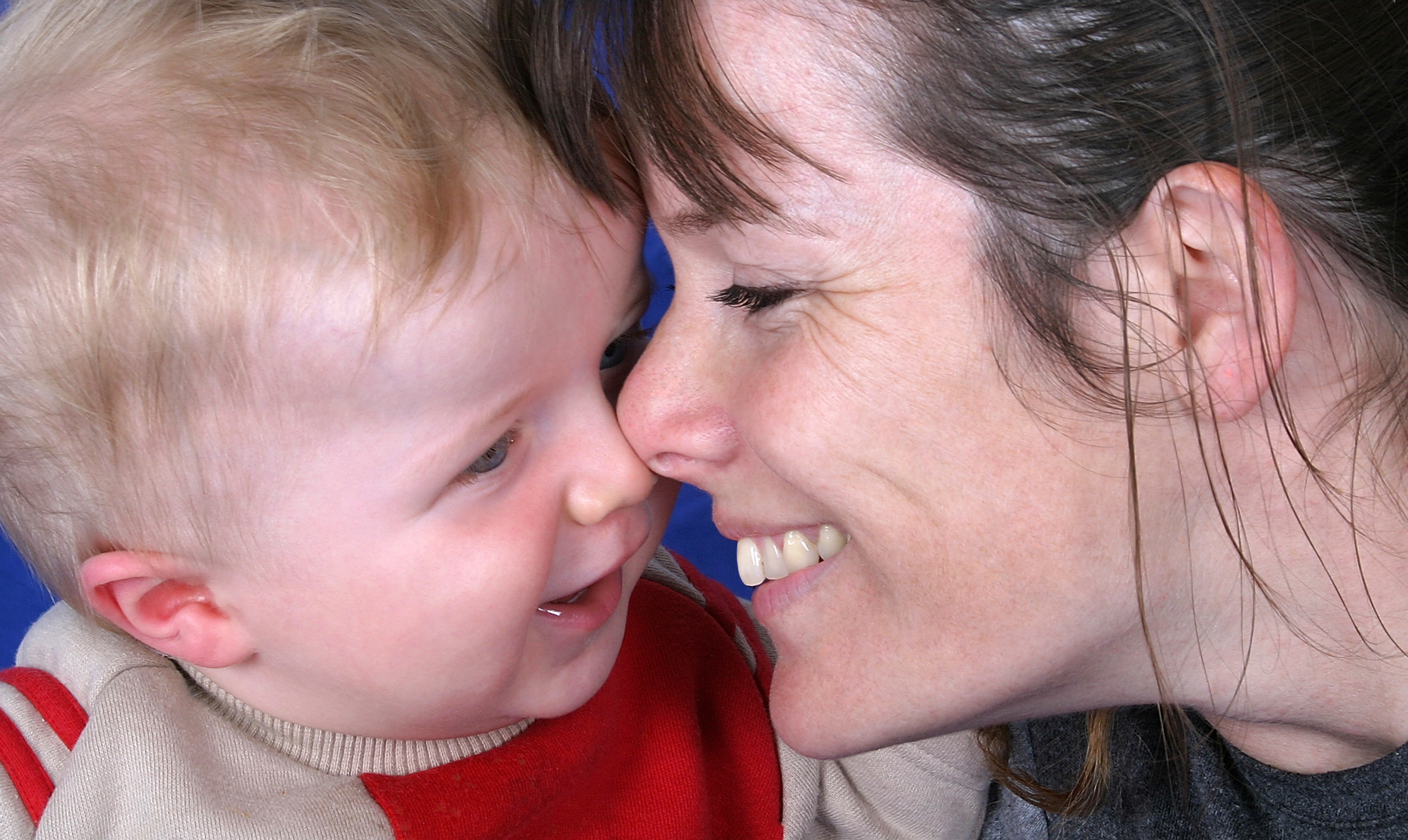|

Many of the people I meet seem to imagine that if only they were different, they would be much
better parents. If only they had time to read the newspaper from cover to cover,
if only they had endless patience to deal with questions at the "arsenic hour" before dinner, if only they had enough religious
faith to offer airtight explanations of life's problems, then they could offer neutral, enlightened answers to their children's
questions.
What our children really need, though, is not a neutral adviser but a conscious, caring one. They
need our full humanity, our genuine presence. They need us to
be the down-to-earth people we really are, with the capacity to love, to hate, to be affectionate, to get angry, to appreciate
their joyous innocence, to be wary of the ways of the world. They need our help sorting out their
experience, which is something we can do best if we are willing to reflect on our own experiences -- not necessarily to share
the details with them, of course, but to convey the truths we are learning from our own lives. Our children need us to listen to them, and not some other, more "objective" person, because we care so
passionately about them. Our answers reflect our understanding of our particular child and our hopes and dreams for
her future. They are intimately connected to the whole parent-child relationship. As D. W. Winnicott observed in an essay
on moral growth, "there is more to be gained from love than from education."
Just as trying to be neutral prevents us from being fully present to our children, so does being prisoners
of our own anxieties and ambivalence. To be fully present is not to be free of conflict, but it is to be aware. When
a particular question often makes us anxious, or when we notice ourselves changing the subject, that is usually a sign that
we need to look inward. The question is probably stirring up something deep in ourselves, and in order to listen effectively
to the child's question we need to attend to our own feelings about it....
Tell your own truth. Speak from your experience. If someone we love is dying and
a child asks, "Will he go to heaven?" we're far better off giving an answer we believe in than temporarily borrowing a religious
belief in which we have little conviction. If a child asks a question about sex, we're likely to stammer and stutter if the
things we want to tell her are difficult to reconcile with our own life experience or beliefs. To be truly present is to be
honest, which doesn't mean telling a child things she is not ready for or things that have more to do with our own
questions than with hers. We should also be careful not to tell her things that ring hollow in our own ears. Paradoxically,
listening to our child's fear, anger, bewilderment, and sadness in the face of loss is far more comforting than offering
pat answers. Our humble attention is a way of sharing sacred presence.
You're home from work, you're fixing dinner while your child does his homework at the kitchen table, and
the telephone rings every ten minutes or so with news from the soccer coach, Scout leader, or class parent. Out of the blue
your child asks, "What's child abuse?" Take a deep breath. If you launch into a long-winded explanation before you've really
heard what's bothering your child, he is likely to repeat the question several more times -- or tune you out. Instead, focus
on listening.

Step One: Show empathy. Depending
on your child's age, ask yourself, "Why is he coming up with this question?" When faced with what sounds like an imponderable
query of cosmic dimensions, encourage him to speak in concrete terms about a specific situation.
- Keep in mind that this does not mean he is eager to expound on all his thoughts and feelings.
He may only wish to say a single sentence, such as, "I saw a baby that was beaten on the TV news. A man did it." Rather than
ask for factual details, such as, "Was the man the baby's father?" or "Did the baby die?" focus on describing the way your
child might have reacted emotionally:
"It must have been very scary."
"That man did a terrible thing."
- "What an awful thing, to hit a little baby."
By empathizing with your child, you are validating his perception.
Use simple, direct language.
Try to focus on the situation or question itself. You might overwhelm your child if you make pointed
remarks such as "You must be afraid someone will hit you [or your baby cousin] that way." Although it is often possible --
and important -- to talk about the child's own fears, since children rarely experience anything impersonally, it is wise to
proceed slowly or your child may decide to stop talking altogether. With a preteen or adolescent, let him talk. By wondering
out loud he comes to understand what he thinks.
With a child of any age, but particularly an adolescent, notice body language. He may say, "It don't care," or "It's no big deal," but if his eyes are downcast,
he's slumped, and he looks sad, his feelings may be different from his words. He will respond if you avoid plunging in with
a guess about how he really feels and simple express your concern in a low-key way: "You know, I'm worried about you lately.
You've been looking a little down."
Sometimes sharing your own feelings on the subject (usually not "When I was your age,"
though) can help him put his into words.
A young child who asks about death or fatal illness, for example, is seeking reassurance, not
a medical history or metaphysical "explanation." One day my daughter came home from kindergarten and said, "A kid told me
his two-year-old cousin died of cancer."
"Oh, I'm sorry. How awful," I said.
"I think he should have worn suntan lotion," she said matter-of-factly.
"Suntan lotion only helps stop skin cancer," I told her. "This child could have had a different
kind of cancer."
"What kind?"
"Oh, blood cancer," I said. "Or bone cancer."
She didn't reply, but later that day she suddenly asked, How do you get blood cancer or bone cancer?"
"I don't know," I said. "We can read about it. It doesn't happen to children very often." I waited,
and when she didn't respond right away, I added, "When it does, it's very sad."
"Yeah," she said quietly. She was silent for a few minutes. "A kid at school told me his two-year-old
cousin died of cancer," said said again, slowly. "He didn't say if it was bone cancer or blood cancer."
My daughter was struggling to grasp the reality of a child's death, long before she was cognitively
ready to "understand" what cancer is. As a mother, I found talking about the death of a child painful beyond words, yet only
by opening up to my own fear could I empathize with my daughter's.
Step Two: Help the child connect the question with personal experience. Helping a child struggle toward meaningful responses to her own questions
rather than handing her our own is in keeping with the original meaning of the word education: "to draw out." Happily,
even if we lack what we consider adequate answers we can be very helpful by encouraging the child to take one small step.
A white second-grader, whose parents had enrolled him in a multiracial school so that he would
have the opportunity to meet all kinds of children, stepped off the school bus one afternoon with a scowl. "How come the black
kids play so rough on the playground?" he asked, and his mother gasped.
This particular little boy, as it turned out, had been kicked in the groin during an informal
soccer game. His mother began by showing empathy. She resisted the well-meaning temptation to scold ("I don't ever want to
hear you say anything like that again!") and instead let him express his pain and anger.
When the child was ready to talk calmly,it was time to teach him the difference between personal
experience and stereotyping. "Those black children played roughly, but not all black children do," she said,
and reminded her son of some happier experiences. "You know some black children in your class who don't play roughly, don't
you?"
Step Three: Follow up. If
a question recurs, it may be time to dig deeper, by sharing appropriate books or helping your child get involved in a related
activity. If your child seems obsessed with money, for example, be sure she has an allowance large enough that it lets her
experiment with saving, spending, making charitable contributions, and even investing (if only in baseball cards)....
Children work on their problem-solving skills in many areas of life. Even minor exchanges teach
her something about how much you respect her learning process. If she chooses to put on a plaid blouse and striped pants in
the morning, do you tell her it looks awful, or let her explain why her clothes "match really well"? When he organizes his
play figures on a shelf you'd planned for books and games, do you make him move them or listen to how he plans to organize
his whole room?....By encouraging your child to think things through and make decisions for herself when possible, and being
available as a resource and support when she needs it, you affirm her way of looking at things. You teach her to learn from
her mistakes.

The minute you step onto your soapbox, have you noticed how your child gets engrossed in play
or actually leaves the room? Children learn about the big
questions of life through the details they struggle with. If we offer generalizations or noble sentiments, we fail utterly
to connect wit the mundane truths they encounter on the playground, in the classroom, and at home. Answers cannot be handed
down as aphorisms.
Happily, your child has the tools and talents to learn to respond to her own questions
with your help. She approaches age-old conundrums with fresh eyes and ears, and often wit the same gusto with which she takes
her first step, learns to write letters on a page, and rides her first two-wheeler. She makes startling connections between
the story she heard at the library last week and the goslings in the park this morning. If she is not satisfied with your
answer, you are likely to overhear her demanding a better one from her big brother or the babysitter.
Rather than offering a simplistic answer, you're better off saying, "I don't know." Then you can begin to explore together. You can read, visit a museum,
ask a friend or neighbor who is more knowledgeable on that particular subject.
Make time for occasions when opportunities to talk might naturally come up....Once a day, even
if you only have fifteen minutes, see if your child would like to do something simple; depending on her age and preferences,
she might like to dance to the radio, sing a song, or show you a new Lego creation.

Making it a point to spend ten minutes a day listening to your child without planning ahead. When
your child begins chattering and you catch yourself drifting off, don't. Instead, pull up a chair and listen. Pay attention
to what she has to say. Be sure you do not criticize her, try to teach her anything, or correct her. Just be there.
Like the rest of us, children have different biological clocks. One child may be firing questions
through your shower curtain every morning, while another eggs you to stay one more minute at bedtime because he needs to tell
you something. If you notice that your routine seems to regularly short-change a child when she is most eager to talk to you,
try to rearrange your schedule. Set the alarm five minutes earlier in the morning, for example, or make bedtime five minutes
earlier so that you have longer to chat before he sleeps.
No parent is available as often as a child would like, of course.
"It seems as though every time I'm diapering the baby, Jason comes up with something he desperately needs to tell me!" said
a mother in one of my workshops. When you feel guilty you're most likely to snap at your child about how busy you are, which
of course only makes you feel worse in the long run. "That's a question I'd really like to talk about with you," you can say.
"Let's sit down and talk about it later when I can pay attention better." If you habitually forget about the question later
on, ask your child to bring it up again: "You know, I'm so busy I'm worried I'm going to forget about this question. I really
do want to talk about it with you -- will you remind me?"
Excerpt from Small Wonder: How to Answer Your Child's Impossible Questions About
Life (Penguin) (c) 1994 by Jean G. Fitzpatrick . All rights reserved.

|

